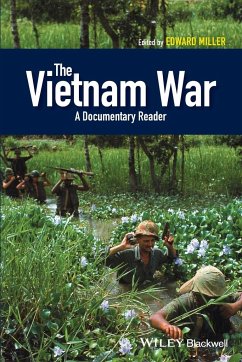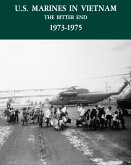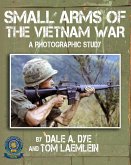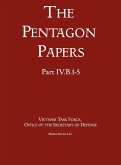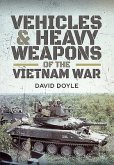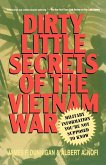Edward Miller
The Vietnam War
Edward Miller
The Vietnam War
- Broschiertes Buch
- Merkliste
- Auf die Merkliste
- Bewerten Bewerten
- Teilen
- Produkt teilen
- Produkterinnerung
- Produkterinnerung
The Vietnam War is an outstanding collection of primary documents related to America's conflict in Vietnam which includes a balance of original American and Vietnamese perspectives, providing a uniquely varied range of insights into both American and Vietnamese experiences. * Includes substantial non-American content, including many original English translations of Vietnamese-authored texts which showcase the diversity and complexity of Vietnamese experiences during the war * Contains original American documents germane to the continuing debates about the causes, consequences and morality of…mehr
Andere Kunden interessierten sich auch für
![Vietnam Vietnam]() BuzzancoVietnam45,99 €
BuzzancoVietnam45,99 €![U.S. Marines in the Vietnam War U.S. Marines in the Vietnam War]() George R. DunhamU.S. Marines in the Vietnam War44,99 €
George R. DunhamU.S. Marines in the Vietnam War44,99 €![Small Arms of the Vietnam War Small Arms of the Vietnam War]() Dale A. DyeSmall Arms of the Vietnam War41,99 €
Dale A. DyeSmall Arms of the Vietnam War41,99 €![United States - Vietnam Relations 1945 - 1967 (The Pentagon Papers) (Volume 3) United States - Vietnam Relations 1945 - 1967 (The Pentagon Papers) (Volume 3)]() Office of the Secretary of DefenseUnited States - Vietnam Relations 1945 - 1967 (The Pentagon Papers) (Volume 3)52,99 €
Office of the Secretary of DefenseUnited States - Vietnam Relations 1945 - 1967 (The Pentagon Papers) (Volume 3)52,99 €![Vehicles and Heavy Weapons of the Vietnam War Vehicles and Heavy Weapons of the Vietnam War]() David DoyleVehicles and Heavy Weapons of the Vietnam War27,99 €
David DoyleVehicles and Heavy Weapons of the Vietnam War27,99 €![Dirty Little Secrets of the Vietnam War Dirty Little Secrets of the Vietnam War]() James F. DunniganDirty Little Secrets of the Vietnam War22,99 €
James F. DunniganDirty Little Secrets of the Vietnam War22,99 €![Nickel On The Grass Nickel On The Grass]() Handley Colonel Usaf (Ret) Philip "HandNickel On The Grass17,99 €
Handley Colonel Usaf (Ret) Philip "HandNickel On The Grass17,99 €-
-
-
The Vietnam War is an outstanding collection of primary documents related to America's conflict in Vietnam which includes a balance of original American and Vietnamese perspectives, providing a uniquely varied range of insights into both American and Vietnamese experiences. * Includes substantial non-American content, including many original English translations of Vietnamese-authored texts which showcase the diversity and complexity of Vietnamese experiences during the war * Contains original American documents germane to the continuing debates about the causes, consequences and morality of the US intervention * Incorporates personal histories of individual Americans and Vietnamese * Introductory headnotes place each document in context * Features a range of non-textual documents, including iconic photographs and political cartoons
Hinweis: Dieser Artikel kann nur an eine deutsche Lieferadresse ausgeliefert werden.
Hinweis: Dieser Artikel kann nur an eine deutsche Lieferadresse ausgeliefert werden.
Produktdetails
- Produktdetails
- Verlag: John Wiley & Sons / Wiley-Blackwell
- Seitenzahl: 292
- Erscheinungstermin: 22. Januar 2016
- Englisch
- Abmessung: 229mm x 152mm x 16mm
- Gewicht: 427g
- ISBN-13: 9781405196789
- ISBN-10: 1405196785
- Artikelnr.: 39600081
- Herstellerkennzeichnung
- Books on Demand GmbH
- In de Tarpen 42
- 22848 Norderstedt
- info@bod.de
- 040 53433511
- Verlag: John Wiley & Sons / Wiley-Blackwell
- Seitenzahl: 292
- Erscheinungstermin: 22. Januar 2016
- Englisch
- Abmessung: 229mm x 152mm x 16mm
- Gewicht: 427g
- ISBN-13: 9781405196789
- ISBN-10: 1405196785
- Artikelnr.: 39600081
- Herstellerkennzeichnung
- Books on Demand GmbH
- In de Tarpen 42
- 22848 Norderstedt
- info@bod.de
- 040 53433511
Edward Miller is Associate Professor of History at Dartmouth College. His research uses archival collections in the US and Vietnam to examine both sides of the Vietnam War experience. His first book, Misalliance: Ngo Dinh Diem, the United States, and the Fate of South Vietnam, will be published in 2013.
Series Editors' Preface x Acknowledgements xii Introduction xiii Chapter 1
Colonialism, Nationalism, and Communism 1 1.1 Tam Lang, I Pulled a Rickshaw
(1932) 1 1.2 The Trial Testimony of Phan Boi Chau (1925) 5 1.3 Ho Chi Minh,
The Path which Led Me to Leninism (1960) 7 1.4 Nguyen Ai Quoc (Ho Chi
Minh), Appeal Made on the Occasion of the Founding of the Vietnamese
Communist Party (1930) 9 1.5 Ho Chi Minh, The Declaration of Independence
of the Democratic Republic of Vietnam (1945) 11 Chapter 2 The First
Indochina War and the Origins of American Involvement 15 2.1 Oral History
of Xuan Vu, Viet Minh War Reporter and Propagandist (1987) 15 2.2 US
Department of State Airgram on French-Vietnamese Relations (1946) 20 2.3
Truong Chinh, "We Struggle for Independence and Democracy" (1948) 22 2.4 US
National Security Council, Report on the Position of the United States with
Respect to Indochina (1950) 26 2.5 Robert Blum, Telegram on US Economic Aid
to France in Indochina (1951) 29 2.6 Memorandum of a Conversation with
President Eisenhower about Dien Bien Phu (1954) 31 2.7 Final Declaration of
the Geneva Conference (1954) 32 Chapter 3 The Two Vietnams 37 3.1 Col.
Edward G. Lansdale, Report on the activities of the Saigon Military Mission
(1955) 37 3.2 Ngo Dinh Diem,Message to the RVN National Assembly on the
Foundations of the Constitution (1956) 46 3.3 Wolf Ladejinsky, A Visit with
President Ngo Dinh Diem (1955) 49 3.4 Vietnam Workers' Party Politburo,
Directive Regarding Land Reform (1953) 52 3.5 Oral History of Han Vi,
Musicologist and Communist Party Cadre 55 Chapter 4 The Rise of the "Viet
Cong" 61 4.1 Le Duan, The Path to Revolution in the South (1956) 61 4.2 A
Communist Party Account of the Situation in the Nam Bo Region of South
Vietnam (1961) 69 4.3 A Poor Farmer's Account of the 1960 "Concerted
Uprising" in My Tho Province (1967) 72 4.4 Program of the National
Liberation Front of South Vietnam (1960) 75 Chapter 5 The Fall of Diem 81
5.1 The Caravelle Manifesto (1960) 81 5.2 Report of the Taylor Mission to
South Vietnam (1961) 88 5.3 The Self-Immolation of Thich Quang Duc (1963)
90 5.4 Transcript of a Phone Conversation between Ngo Dinh Diem and Henry
Cabot Lodge (November 1, 1963) 92 5.5 John F. Kennedy, Comments on the
Saigon Coup (November 4, 1963) 93 Chapter 6 Escalation 96 6.1 Resolution of
the Central Committee of the Vietnam Workers' Party: Strive to Struggle,
Rush Forward to Win New Victories in the South (December 1963) 96 6.2
Recording of a Phone Conversation between Lyndon Johnson and Robert
McNamara (April 30, 1964) 100 6.3 The Tonkin Gulf Resolution (August 1964)
103 6.4 US Senator Wayne Morse, Speech on the Tonkin Gulf Resolution
(August 5, 1964) 104 6.5 George Ball, "A Compromise Solution for South
Vietnam" (1965) 106 6.6 Notes of a Meeting at the White House (July 21,
1965) 110 Chapter 7 On the Battlefield 115 7.1 A South Vietnamese Account
of the Battle of Ap Bac (1995) 115 7.2 Interrogation of a Captured NLF
Fighter (1967) 120 7.3 Oral History of Tom Esslinger, US Marine Lieutenant
and Veteran of the Battle of Khe Sanh (2003) 124 7.4 Varnado Simpson,
Testimony about the My Lai Massacre (1969) 132 7.5 Oral History of Wilson
Key, US Navy Pilot and Prisoner of War (2004) 135 7.6 A North Vietnamese
soldier remembers the Bombing of North Vietnam (1970) 142 7.7 Kim Phuc and
the Napalm Attack on Trang Bang Village (1972) 144 Chapter 8 The Tet
Offensive 147 8.1 Resolution of the 14th Plenum of the VWP Central
Committee (January 1968) 147 8.2 US Central Intelligence Agency Report on
the Communist Tet Offensive (January 31, 1968) 152 8.3 The Execution of
Nguyen Van Lem 155 8.4 General Huynh Cong Than, "The General Offensive and
Uprising in the Southern Sector of Saigon" (1994) 156 8.5 Walter Cronkite,
Remarks on the Tet Offensive (February 1968) 163 8.6 Lyndon B. Johnson,
Address to the Nation Announcing Steps to Limit the War in Vietnam (March
31, 1968) 165 Chapter 9 Home Fronts 172 9.1 Students for a Democratic
Society, "Build, Not Burn" (1965) 172 9.2 Young Americans for Freedom, "Aid
and Comfort to the Enemy" (1965) 174 9.3 Student Non-violent Coordinating
Committee, Statement Against the War in Vietnam (1966) 176 9.4 Nicholas
Garland, Cartoon of Lyndon Johnson (1966) 178 9.5 Pete Seeger, "Waist Deep
in the Big Muddy"(1967) 179 9.6 Senator George McGovern, Speech in Support
of the McGovern-Hatfield Amendment to End the War in Indochina (1970) 181
9.7 Ngo Cong Duc, "Anti-Americanism: Common Cause in Vietnam" (1970) 183
9.8 Terry Nelson and C-Company, "The Battle Hymn of Lt Calley" (1971) 190
9.9 Daniel Ellsberg, "Murder and the Lying Machine" (2002) 192 Chapter 10
Pacification, Vietnamization, and "Fighting While Negotiating" 197 10.1
William Westmoreland, "The Refugee Problem" (1968) 197 10.2 Robert Komer,
"The Phoenix Program and the Attack on the Viet Cong Infrastructure" (1969)
200 10.3 A Communist Cadre Describes Pacification in My Tho Province During
1969-1970 204 10.4 Le Duc Tho and Chinese Foreign Minister Chen Yi Discuss
the Paris Peace Talks (1968) 205 10.5 Henry Kissinger Negotiates with Le
Duc Tho (1971) 207 10.6 Richard Nixon and Henry Kissinger Discuss the Fate
of South Vietnam (August 1972) 213 Chapter 11 Victory and Defeat 216 11.1
Jacques Leslie, A Visit to Viet Cong Territory (1995) 216 11.2 Bui Tin, An
Account of the Surrender of South Vietnam (1981) 221 11.3 Nguyen Thi Hoa,
"Mom, I'm leaving now. I will make you very proud of me." 223 Chapter 12
Memories and Legacies 226 12.1 The POW/MIA Flag 226 12.2 Excerpt from Quang
X. Pham, Excerpt from A Sense of Duty: Our Journey from Vietnam to America
(2005) 227 12.3 A US Army Nurse Remembers Vietnam (2004) 232 12.4 A Letter
Left at the Vietnam Veterans Memorial 238 12.5 George W. Bush, Speech at a
Veterans of Foreign Wars Convention (2007) 239 12.6 Vo Van Kiet, "Healing
the Wound" (2005) 243 Index 249
Colonialism, Nationalism, and Communism 1 1.1 Tam Lang, I Pulled a Rickshaw
(1932) 1 1.2 The Trial Testimony of Phan Boi Chau (1925) 5 1.3 Ho Chi Minh,
The Path which Led Me to Leninism (1960) 7 1.4 Nguyen Ai Quoc (Ho Chi
Minh), Appeal Made on the Occasion of the Founding of the Vietnamese
Communist Party (1930) 9 1.5 Ho Chi Minh, The Declaration of Independence
of the Democratic Republic of Vietnam (1945) 11 Chapter 2 The First
Indochina War and the Origins of American Involvement 15 2.1 Oral History
of Xuan Vu, Viet Minh War Reporter and Propagandist (1987) 15 2.2 US
Department of State Airgram on French-Vietnamese Relations (1946) 20 2.3
Truong Chinh, "We Struggle for Independence and Democracy" (1948) 22 2.4 US
National Security Council, Report on the Position of the United States with
Respect to Indochina (1950) 26 2.5 Robert Blum, Telegram on US Economic Aid
to France in Indochina (1951) 29 2.6 Memorandum of a Conversation with
President Eisenhower about Dien Bien Phu (1954) 31 2.7 Final Declaration of
the Geneva Conference (1954) 32 Chapter 3 The Two Vietnams 37 3.1 Col.
Edward G. Lansdale, Report on the activities of the Saigon Military Mission
(1955) 37 3.2 Ngo Dinh Diem,Message to the RVN National Assembly on the
Foundations of the Constitution (1956) 46 3.3 Wolf Ladejinsky, A Visit with
President Ngo Dinh Diem (1955) 49 3.4 Vietnam Workers' Party Politburo,
Directive Regarding Land Reform (1953) 52 3.5 Oral History of Han Vi,
Musicologist and Communist Party Cadre 55 Chapter 4 The Rise of the "Viet
Cong" 61 4.1 Le Duan, The Path to Revolution in the South (1956) 61 4.2 A
Communist Party Account of the Situation in the Nam Bo Region of South
Vietnam (1961) 69 4.3 A Poor Farmer's Account of the 1960 "Concerted
Uprising" in My Tho Province (1967) 72 4.4 Program of the National
Liberation Front of South Vietnam (1960) 75 Chapter 5 The Fall of Diem 81
5.1 The Caravelle Manifesto (1960) 81 5.2 Report of the Taylor Mission to
South Vietnam (1961) 88 5.3 The Self-Immolation of Thich Quang Duc (1963)
90 5.4 Transcript of a Phone Conversation between Ngo Dinh Diem and Henry
Cabot Lodge (November 1, 1963) 92 5.5 John F. Kennedy, Comments on the
Saigon Coup (November 4, 1963) 93 Chapter 6 Escalation 96 6.1 Resolution of
the Central Committee of the Vietnam Workers' Party: Strive to Struggle,
Rush Forward to Win New Victories in the South (December 1963) 96 6.2
Recording of a Phone Conversation between Lyndon Johnson and Robert
McNamara (April 30, 1964) 100 6.3 The Tonkin Gulf Resolution (August 1964)
103 6.4 US Senator Wayne Morse, Speech on the Tonkin Gulf Resolution
(August 5, 1964) 104 6.5 George Ball, "A Compromise Solution for South
Vietnam" (1965) 106 6.6 Notes of a Meeting at the White House (July 21,
1965) 110 Chapter 7 On the Battlefield 115 7.1 A South Vietnamese Account
of the Battle of Ap Bac (1995) 115 7.2 Interrogation of a Captured NLF
Fighter (1967) 120 7.3 Oral History of Tom Esslinger, US Marine Lieutenant
and Veteran of the Battle of Khe Sanh (2003) 124 7.4 Varnado Simpson,
Testimony about the My Lai Massacre (1969) 132 7.5 Oral History of Wilson
Key, US Navy Pilot and Prisoner of War (2004) 135 7.6 A North Vietnamese
soldier remembers the Bombing of North Vietnam (1970) 142 7.7 Kim Phuc and
the Napalm Attack on Trang Bang Village (1972) 144 Chapter 8 The Tet
Offensive 147 8.1 Resolution of the 14th Plenum of the VWP Central
Committee (January 1968) 147 8.2 US Central Intelligence Agency Report on
the Communist Tet Offensive (January 31, 1968) 152 8.3 The Execution of
Nguyen Van Lem 155 8.4 General Huynh Cong Than, "The General Offensive and
Uprising in the Southern Sector of Saigon" (1994) 156 8.5 Walter Cronkite,
Remarks on the Tet Offensive (February 1968) 163 8.6 Lyndon B. Johnson,
Address to the Nation Announcing Steps to Limit the War in Vietnam (March
31, 1968) 165 Chapter 9 Home Fronts 172 9.1 Students for a Democratic
Society, "Build, Not Burn" (1965) 172 9.2 Young Americans for Freedom, "Aid
and Comfort to the Enemy" (1965) 174 9.3 Student Non-violent Coordinating
Committee, Statement Against the War in Vietnam (1966) 176 9.4 Nicholas
Garland, Cartoon of Lyndon Johnson (1966) 178 9.5 Pete Seeger, "Waist Deep
in the Big Muddy"(1967) 179 9.6 Senator George McGovern, Speech in Support
of the McGovern-Hatfield Amendment to End the War in Indochina (1970) 181
9.7 Ngo Cong Duc, "Anti-Americanism: Common Cause in Vietnam" (1970) 183
9.8 Terry Nelson and C-Company, "The Battle Hymn of Lt Calley" (1971) 190
9.9 Daniel Ellsberg, "Murder and the Lying Machine" (2002) 192 Chapter 10
Pacification, Vietnamization, and "Fighting While Negotiating" 197 10.1
William Westmoreland, "The Refugee Problem" (1968) 197 10.2 Robert Komer,
"The Phoenix Program and the Attack on the Viet Cong Infrastructure" (1969)
200 10.3 A Communist Cadre Describes Pacification in My Tho Province During
1969-1970 204 10.4 Le Duc Tho and Chinese Foreign Minister Chen Yi Discuss
the Paris Peace Talks (1968) 205 10.5 Henry Kissinger Negotiates with Le
Duc Tho (1971) 207 10.6 Richard Nixon and Henry Kissinger Discuss the Fate
of South Vietnam (August 1972) 213 Chapter 11 Victory and Defeat 216 11.1
Jacques Leslie, A Visit to Viet Cong Territory (1995) 216 11.2 Bui Tin, An
Account of the Surrender of South Vietnam (1981) 221 11.3 Nguyen Thi Hoa,
"Mom, I'm leaving now. I will make you very proud of me." 223 Chapter 12
Memories and Legacies 226 12.1 The POW/MIA Flag 226 12.2 Excerpt from Quang
X. Pham, Excerpt from A Sense of Duty: Our Journey from Vietnam to America
(2005) 227 12.3 A US Army Nurse Remembers Vietnam (2004) 232 12.4 A Letter
Left at the Vietnam Veterans Memorial 238 12.5 George W. Bush, Speech at a
Veterans of Foreign Wars Convention (2007) 239 12.6 Vo Van Kiet, "Healing
the Wound" (2005) 243 Index 249
Series Editors' Preface x Acknowledgements xii Introduction xiii Chapter 1
Colonialism, Nationalism, and Communism 1 1.1 Tam Lang, I Pulled a Rickshaw
(1932) 1 1.2 The Trial Testimony of Phan Boi Chau (1925) 5 1.3 Ho Chi Minh,
The Path which Led Me to Leninism (1960) 7 1.4 Nguyen Ai Quoc (Ho Chi
Minh), Appeal Made on the Occasion of the Founding of the Vietnamese
Communist Party (1930) 9 1.5 Ho Chi Minh, The Declaration of Independence
of the Democratic Republic of Vietnam (1945) 11 Chapter 2 The First
Indochina War and the Origins of American Involvement 15 2.1 Oral History
of Xuan Vu, Viet Minh War Reporter and Propagandist (1987) 15 2.2 US
Department of State Airgram on French-Vietnamese Relations (1946) 20 2.3
Truong Chinh, "We Struggle for Independence and Democracy" (1948) 22 2.4 US
National Security Council, Report on the Position of the United States with
Respect to Indochina (1950) 26 2.5 Robert Blum, Telegram on US Economic Aid
to France in Indochina (1951) 29 2.6 Memorandum of a Conversation with
President Eisenhower about Dien Bien Phu (1954) 31 2.7 Final Declaration of
the Geneva Conference (1954) 32 Chapter 3 The Two Vietnams 37 3.1 Col.
Edward G. Lansdale, Report on the activities of the Saigon Military Mission
(1955) 37 3.2 Ngo Dinh Diem,Message to the RVN National Assembly on the
Foundations of the Constitution (1956) 46 3.3 Wolf Ladejinsky, A Visit with
President Ngo Dinh Diem (1955) 49 3.4 Vietnam Workers' Party Politburo,
Directive Regarding Land Reform (1953) 52 3.5 Oral History of Han Vi,
Musicologist and Communist Party Cadre 55 Chapter 4 The Rise of the "Viet
Cong" 61 4.1 Le Duan, The Path to Revolution in the South (1956) 61 4.2 A
Communist Party Account of the Situation in the Nam Bo Region of South
Vietnam (1961) 69 4.3 A Poor Farmer's Account of the 1960 "Concerted
Uprising" in My Tho Province (1967) 72 4.4 Program of the National
Liberation Front of South Vietnam (1960) 75 Chapter 5 The Fall of Diem 81
5.1 The Caravelle Manifesto (1960) 81 5.2 Report of the Taylor Mission to
South Vietnam (1961) 88 5.3 The Self-Immolation of Thich Quang Duc (1963)
90 5.4 Transcript of a Phone Conversation between Ngo Dinh Diem and Henry
Cabot Lodge (November 1, 1963) 92 5.5 John F. Kennedy, Comments on the
Saigon Coup (November 4, 1963) 93 Chapter 6 Escalation 96 6.1 Resolution of
the Central Committee of the Vietnam Workers' Party: Strive to Struggle,
Rush Forward to Win New Victories in the South (December 1963) 96 6.2
Recording of a Phone Conversation between Lyndon Johnson and Robert
McNamara (April 30, 1964) 100 6.3 The Tonkin Gulf Resolution (August 1964)
103 6.4 US Senator Wayne Morse, Speech on the Tonkin Gulf Resolution
(August 5, 1964) 104 6.5 George Ball, "A Compromise Solution for South
Vietnam" (1965) 106 6.6 Notes of a Meeting at the White House (July 21,
1965) 110 Chapter 7 On the Battlefield 115 7.1 A South Vietnamese Account
of the Battle of Ap Bac (1995) 115 7.2 Interrogation of a Captured NLF
Fighter (1967) 120 7.3 Oral History of Tom Esslinger, US Marine Lieutenant
and Veteran of the Battle of Khe Sanh (2003) 124 7.4 Varnado Simpson,
Testimony about the My Lai Massacre (1969) 132 7.5 Oral History of Wilson
Key, US Navy Pilot and Prisoner of War (2004) 135 7.6 A North Vietnamese
soldier remembers the Bombing of North Vietnam (1970) 142 7.7 Kim Phuc and
the Napalm Attack on Trang Bang Village (1972) 144 Chapter 8 The Tet
Offensive 147 8.1 Resolution of the 14th Plenum of the VWP Central
Committee (January 1968) 147 8.2 US Central Intelligence Agency Report on
the Communist Tet Offensive (January 31, 1968) 152 8.3 The Execution of
Nguyen Van Lem 155 8.4 General Huynh Cong Than, "The General Offensive and
Uprising in the Southern Sector of Saigon" (1994) 156 8.5 Walter Cronkite,
Remarks on the Tet Offensive (February 1968) 163 8.6 Lyndon B. Johnson,
Address to the Nation Announcing Steps to Limit the War in Vietnam (March
31, 1968) 165 Chapter 9 Home Fronts 172 9.1 Students for a Democratic
Society, "Build, Not Burn" (1965) 172 9.2 Young Americans for Freedom, "Aid
and Comfort to the Enemy" (1965) 174 9.3 Student Non-violent Coordinating
Committee, Statement Against the War in Vietnam (1966) 176 9.4 Nicholas
Garland, Cartoon of Lyndon Johnson (1966) 178 9.5 Pete Seeger, "Waist Deep
in the Big Muddy"(1967) 179 9.6 Senator George McGovern, Speech in Support
of the McGovern-Hatfield Amendment to End the War in Indochina (1970) 181
9.7 Ngo Cong Duc, "Anti-Americanism: Common Cause in Vietnam" (1970) 183
9.8 Terry Nelson and C-Company, "The Battle Hymn of Lt Calley" (1971) 190
9.9 Daniel Ellsberg, "Murder and the Lying Machine" (2002) 192 Chapter 10
Pacification, Vietnamization, and "Fighting While Negotiating" 197 10.1
William Westmoreland, "The Refugee Problem" (1968) 197 10.2 Robert Komer,
"The Phoenix Program and the Attack on the Viet Cong Infrastructure" (1969)
200 10.3 A Communist Cadre Describes Pacification in My Tho Province During
1969-1970 204 10.4 Le Duc Tho and Chinese Foreign Minister Chen Yi Discuss
the Paris Peace Talks (1968) 205 10.5 Henry Kissinger Negotiates with Le
Duc Tho (1971) 207 10.6 Richard Nixon and Henry Kissinger Discuss the Fate
of South Vietnam (August 1972) 213 Chapter 11 Victory and Defeat 216 11.1
Jacques Leslie, A Visit to Viet Cong Territory (1995) 216 11.2 Bui Tin, An
Account of the Surrender of South Vietnam (1981) 221 11.3 Nguyen Thi Hoa,
"Mom, I'm leaving now. I will make you very proud of me." 223 Chapter 12
Memories and Legacies 226 12.1 The POW/MIA Flag 226 12.2 Excerpt from Quang
X. Pham, Excerpt from A Sense of Duty: Our Journey from Vietnam to America
(2005) 227 12.3 A US Army Nurse Remembers Vietnam (2004) 232 12.4 A Letter
Left at the Vietnam Veterans Memorial 238 12.5 George W. Bush, Speech at a
Veterans of Foreign Wars Convention (2007) 239 12.6 Vo Van Kiet, "Healing
the Wound" (2005) 243 Index 249
Colonialism, Nationalism, and Communism 1 1.1 Tam Lang, I Pulled a Rickshaw
(1932) 1 1.2 The Trial Testimony of Phan Boi Chau (1925) 5 1.3 Ho Chi Minh,
The Path which Led Me to Leninism (1960) 7 1.4 Nguyen Ai Quoc (Ho Chi
Minh), Appeal Made on the Occasion of the Founding of the Vietnamese
Communist Party (1930) 9 1.5 Ho Chi Minh, The Declaration of Independence
of the Democratic Republic of Vietnam (1945) 11 Chapter 2 The First
Indochina War and the Origins of American Involvement 15 2.1 Oral History
of Xuan Vu, Viet Minh War Reporter and Propagandist (1987) 15 2.2 US
Department of State Airgram on French-Vietnamese Relations (1946) 20 2.3
Truong Chinh, "We Struggle for Independence and Democracy" (1948) 22 2.4 US
National Security Council, Report on the Position of the United States with
Respect to Indochina (1950) 26 2.5 Robert Blum, Telegram on US Economic Aid
to France in Indochina (1951) 29 2.6 Memorandum of a Conversation with
President Eisenhower about Dien Bien Phu (1954) 31 2.7 Final Declaration of
the Geneva Conference (1954) 32 Chapter 3 The Two Vietnams 37 3.1 Col.
Edward G. Lansdale, Report on the activities of the Saigon Military Mission
(1955) 37 3.2 Ngo Dinh Diem,Message to the RVN National Assembly on the
Foundations of the Constitution (1956) 46 3.3 Wolf Ladejinsky, A Visit with
President Ngo Dinh Diem (1955) 49 3.4 Vietnam Workers' Party Politburo,
Directive Regarding Land Reform (1953) 52 3.5 Oral History of Han Vi,
Musicologist and Communist Party Cadre 55 Chapter 4 The Rise of the "Viet
Cong" 61 4.1 Le Duan, The Path to Revolution in the South (1956) 61 4.2 A
Communist Party Account of the Situation in the Nam Bo Region of South
Vietnam (1961) 69 4.3 A Poor Farmer's Account of the 1960 "Concerted
Uprising" in My Tho Province (1967) 72 4.4 Program of the National
Liberation Front of South Vietnam (1960) 75 Chapter 5 The Fall of Diem 81
5.1 The Caravelle Manifesto (1960) 81 5.2 Report of the Taylor Mission to
South Vietnam (1961) 88 5.3 The Self-Immolation of Thich Quang Duc (1963)
90 5.4 Transcript of a Phone Conversation between Ngo Dinh Diem and Henry
Cabot Lodge (November 1, 1963) 92 5.5 John F. Kennedy, Comments on the
Saigon Coup (November 4, 1963) 93 Chapter 6 Escalation 96 6.1 Resolution of
the Central Committee of the Vietnam Workers' Party: Strive to Struggle,
Rush Forward to Win New Victories in the South (December 1963) 96 6.2
Recording of a Phone Conversation between Lyndon Johnson and Robert
McNamara (April 30, 1964) 100 6.3 The Tonkin Gulf Resolution (August 1964)
103 6.4 US Senator Wayne Morse, Speech on the Tonkin Gulf Resolution
(August 5, 1964) 104 6.5 George Ball, "A Compromise Solution for South
Vietnam" (1965) 106 6.6 Notes of a Meeting at the White House (July 21,
1965) 110 Chapter 7 On the Battlefield 115 7.1 A South Vietnamese Account
of the Battle of Ap Bac (1995) 115 7.2 Interrogation of a Captured NLF
Fighter (1967) 120 7.3 Oral History of Tom Esslinger, US Marine Lieutenant
and Veteran of the Battle of Khe Sanh (2003) 124 7.4 Varnado Simpson,
Testimony about the My Lai Massacre (1969) 132 7.5 Oral History of Wilson
Key, US Navy Pilot and Prisoner of War (2004) 135 7.6 A North Vietnamese
soldier remembers the Bombing of North Vietnam (1970) 142 7.7 Kim Phuc and
the Napalm Attack on Trang Bang Village (1972) 144 Chapter 8 The Tet
Offensive 147 8.1 Resolution of the 14th Plenum of the VWP Central
Committee (January 1968) 147 8.2 US Central Intelligence Agency Report on
the Communist Tet Offensive (January 31, 1968) 152 8.3 The Execution of
Nguyen Van Lem 155 8.4 General Huynh Cong Than, "The General Offensive and
Uprising in the Southern Sector of Saigon" (1994) 156 8.5 Walter Cronkite,
Remarks on the Tet Offensive (February 1968) 163 8.6 Lyndon B. Johnson,
Address to the Nation Announcing Steps to Limit the War in Vietnam (March
31, 1968) 165 Chapter 9 Home Fronts 172 9.1 Students for a Democratic
Society, "Build, Not Burn" (1965) 172 9.2 Young Americans for Freedom, "Aid
and Comfort to the Enemy" (1965) 174 9.3 Student Non-violent Coordinating
Committee, Statement Against the War in Vietnam (1966) 176 9.4 Nicholas
Garland, Cartoon of Lyndon Johnson (1966) 178 9.5 Pete Seeger, "Waist Deep
in the Big Muddy"(1967) 179 9.6 Senator George McGovern, Speech in Support
of the McGovern-Hatfield Amendment to End the War in Indochina (1970) 181
9.7 Ngo Cong Duc, "Anti-Americanism: Common Cause in Vietnam" (1970) 183
9.8 Terry Nelson and C-Company, "The Battle Hymn of Lt Calley" (1971) 190
9.9 Daniel Ellsberg, "Murder and the Lying Machine" (2002) 192 Chapter 10
Pacification, Vietnamization, and "Fighting While Negotiating" 197 10.1
William Westmoreland, "The Refugee Problem" (1968) 197 10.2 Robert Komer,
"The Phoenix Program and the Attack on the Viet Cong Infrastructure" (1969)
200 10.3 A Communist Cadre Describes Pacification in My Tho Province During
1969-1970 204 10.4 Le Duc Tho and Chinese Foreign Minister Chen Yi Discuss
the Paris Peace Talks (1968) 205 10.5 Henry Kissinger Negotiates with Le
Duc Tho (1971) 207 10.6 Richard Nixon and Henry Kissinger Discuss the Fate
of South Vietnam (August 1972) 213 Chapter 11 Victory and Defeat 216 11.1
Jacques Leslie, A Visit to Viet Cong Territory (1995) 216 11.2 Bui Tin, An
Account of the Surrender of South Vietnam (1981) 221 11.3 Nguyen Thi Hoa,
"Mom, I'm leaving now. I will make you very proud of me." 223 Chapter 12
Memories and Legacies 226 12.1 The POW/MIA Flag 226 12.2 Excerpt from Quang
X. Pham, Excerpt from A Sense of Duty: Our Journey from Vietnam to America
(2005) 227 12.3 A US Army Nurse Remembers Vietnam (2004) 232 12.4 A Letter
Left at the Vietnam Veterans Memorial 238 12.5 George W. Bush, Speech at a
Veterans of Foreign Wars Convention (2007) 239 12.6 Vo Van Kiet, "Healing
the Wound" (2005) 243 Index 249

